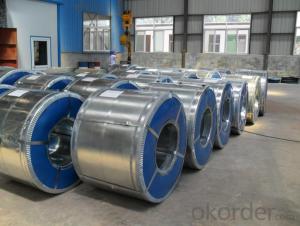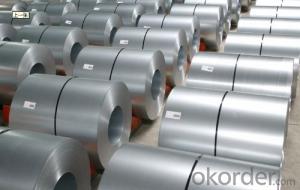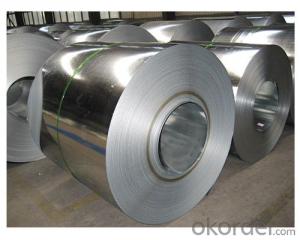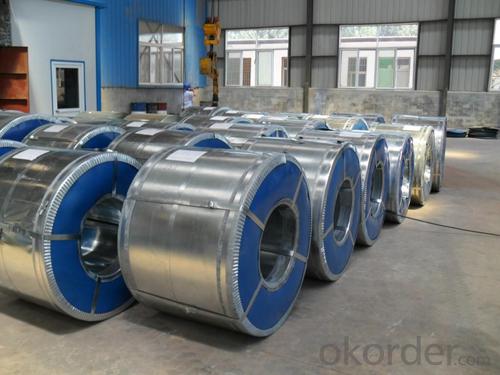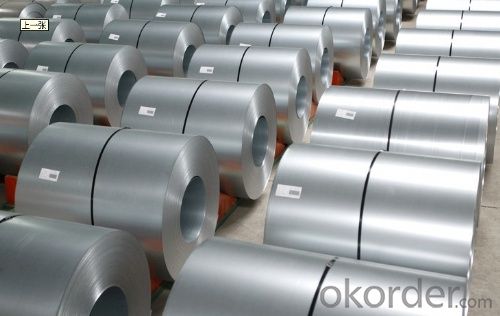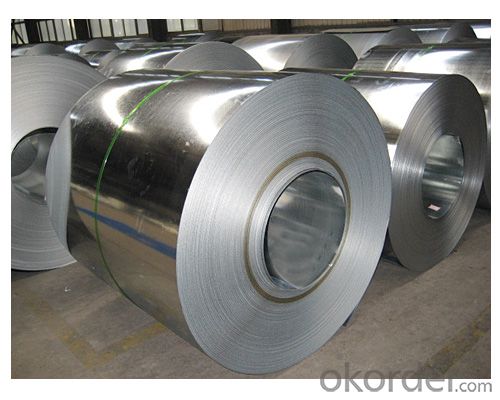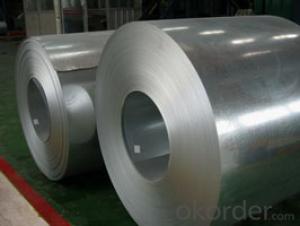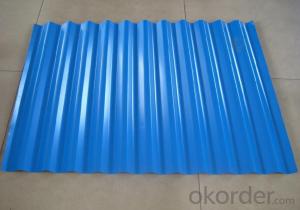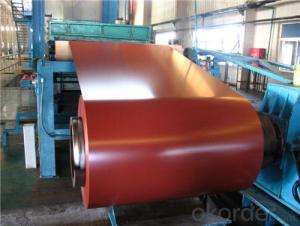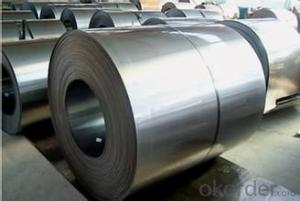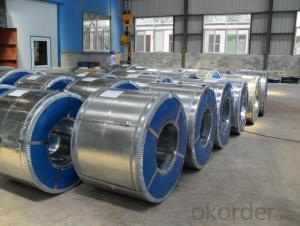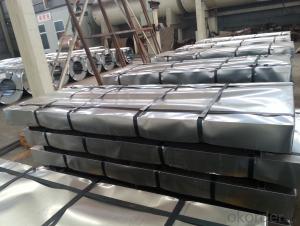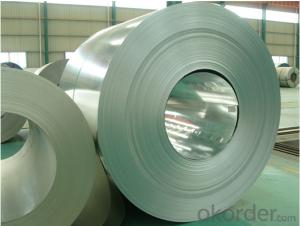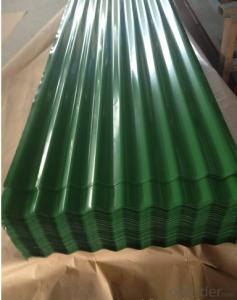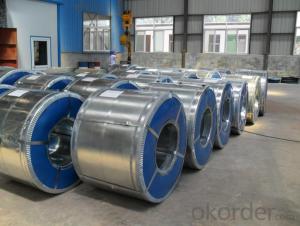Prime Quality Hot-dip galvanized steel coil and sheet
- Loading Port:
- Tianjin
- Payment Terms:
- TT OR LC
- Min Order Qty:
- 50 m.t.
- Supply Capability:
- 10000 m.t./month
OKorder Service Pledge
OKorder Financial Service
You Might Also Like
Commodity | Hot dip galvanized steel coil and sheet |
Technical Standard: | JIS 3302 / ASTM A653 / EN10143 |
Grade | DX51D / DX52D/ DX53D/ S250,280,320GD |
Types: | Commercial / Drawing / Deep Drawing / Structural quality |
Width | 500/650/726/820/914/1000/1200/1219/1220/1250mm |
Thickness | 0.12-2.8mm |
Type of coating: | Galvanized |
Zinc coating | Z30-275g/m2 |
Surface Treatment | Chromed / Skin-pass/ Oiled/Slightly Oiled/ Dry/ Anti-fingerprint |
Surface structure: | Zero spangle / minimized spangle / regular spangle/ big spangle |
ID coil | 508mm or 610mm |
Coil weight | 3-8 MT per coil |
Package: | Properly packed for ocean freight exportation in 20''containers |
Application: | Industrial panels, roofing and siding for painting |
Price terms | FOB,CFR,CIF |
Payment terms | T/T or L/C |
Delivery time | Within 30 days |
Remarks | Insurance is all risks |
MTC will be handed on with shipping documents | |
We accept the third party certification test,such as SGS/BV |
- Q: What is the maximum temperature that steel coils can withstand?
- The maximum temperature that steel coils can withstand typically depends on the grade of steel being used. However, in general, steel coils can withstand temperatures up to around 1,200 to 1,300 degrees Celsius (2,192 to 2,372 degrees Fahrenheit) before they start to lose their structural integrity.
- Q: Does anyone know the lyrics to steel driving man by Dailey and Vincent. I would really appreciate it
- watch man of steel full movie online free adf.ly/dfxYD
- Q: I noticed that Jimmy Page finger picked on a steel acoustic guitar on quite a few tracks like Stairway to heaven and other ones and I was wondering how did he do it? I know it is more difficult to finger pick on a steel acoustic because of the rougher steel strings and higher tensions so I was wondering do they make specific strings that allow for fingerstyle playing? Also Randy Rhoads finger picked a steel acoustic on Dee along with a Classical guitar.
- Nylon Acoustic Guitars
- Q: i recently got an industrial piercing and instead of getting pierced with a metal bar i have a PTFE bar .. i eventually want to put in a metal bar but what kind do i get? whats the difference between a surgical steel and titanium bar?thanks
- Titanium Industrial Bar
- Q: Can steel coils be stored outdoors?
- Steel coils can be stored outdoors, but it is important to protect them from moisture and other environmental elements to prevent rust and damage.
- Q: I plan to buy a bushcraft knife ..The blade made up by damascus steel.My question is ,is damascus steel is very strong ?
- So, there isn't a good answer to your question, because Damascus doesn't describe the actual materials properties of the steel, rather the mechanical construct of the steel. For example: A very common Damascus steel is to layer L6 with 1080 high carbon steel and forge weld the layers together to make a blank, anneal it, then grind it into your blade and heat treat it. (Massive over simplification) That type of Damascus steel is going to be a bit softer than one of the super high carbon exotics, but will be tougher in terms of ability to flex without taking a set, and not chipping out if the edge hits something hard. (assuming it is heat treated well) - edge between RC56 - 58 typically. Another common Damascus steel is layers of VG-10 steel and VG-1 steel also welded together, with the billet then annealed, ground, and heat treated. In this case, because you are using stainless steels you will get a much harder edge - RC 60 - 62 typically. It will have better toughness than plain VG-10, but certainly nowhere near what you can get out of L6 or 52100 or something of that sort. Generally, for a bushcraft knife you typically want something like the first type of Damascus because you are looking for a more all purpose tool, and typically a larger knife. The only problem is that in the bush the first types of steel typically rust. The second type is made up of stain resistant steels and will hold up better. So, this brings me around to - why exactly do you want a Damascus blade on your knife? Are you already looking at one you like? Thinkingblade
- Q: what do they use to make stainless steel?and can stainless steel be melted again and again without losing it's Specifications
- Components Of Stainless Steel
- Q: Can anyone tell me what that means. I have seen it on knife blades an such. I am assuming it's a formula for the strength of the metal. who does that scale work, and please keep it simple.
- 440 is an AISI (American Iron and Steel Institute) material specification. It specifies the precise quantities of carbon and other elements present in the alloy. Here are the constituents of AISI 440 steel: Carbon - 0.6 to 0.75% Chromium - 16 to 18% Manganese - less than 1% Molybdenum - less than 0.75% Phosphorus - less than 0.04% Silicon - less than 1% Sulfur - less than 0.03% Iron makes up the remainder. AISI 440 is a heat-treatable, precipitation-hardening stainless steel.
- Q: I've played guitar for years, now I want a steel guitar. As a beginner, to learn and experiment with, which one would be better for me?
- Pedal steel is very difficult. You need to co-ordinate both hands, both feet and both knees to play it effectively. Lap steel is a lot easier. I suppose it depends how much of a challenge you want. A good lap steel guitar is usually cheaper than a good pedal steel too, so that's another consideration to take into account.
- Q: Its big and expensive and i don't know if it would have a logical purpose but its sharp as hell and awesome. Anyways, its made from surgical steel and all i have found on the internet is that its probably 316L (w/e that means). I have another knife made from 440 stainless steel and as far as i know that is pretty much the hardest stainless metal. So why would the more expensive one be made from surgical steel?
- Surgical Steel Knife
Send your message to us
Prime Quality Hot-dip galvanized steel coil and sheet
- Loading Port:
- Tianjin
- Payment Terms:
- TT OR LC
- Min Order Qty:
- 50 m.t.
- Supply Capability:
- 10000 m.t./month
OKorder Service Pledge
OKorder Financial Service
Similar products
Hot products
Hot Searches
Related keywords
